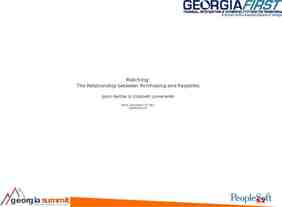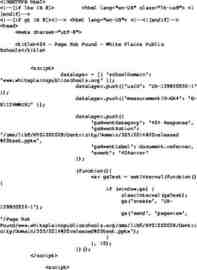Presentation to the Portfolio Committee on Provincial
18 Slides701.00 KB

Presentation to the Portfolio Committee on Provincial & Local Government National Disaster Management Centre Mr Lance Williams 19 20 February 2008 Your partner in service delivery and development

OVERVIEW 1. Purpose of the NDMC 2. Functional areas and strategic objectives of the NDMC 3. High level reflection on the performance of the NDMC 4. Issues raised by the Committee in the previous session in 2007 5. Strategic priorities for 2008/09 dplg 19 20 February 2008 2

1. Purpose of the Branch dplg 19 20 February 2008 3

1.1 Purpose of the NDMC The purpose of the NDMC is to Promote the implementation of the Disaster Management Act (Act 57 of 2002) through the establishment of an integrated and co-ordinated system of disaster management, with special emphasis on risk reduction, which includes o o o disaster prevention, preparedness and mitigation national, provincial and municipal organs of state, statutory functionaries, national government line departments, and other role-players involved in disaster management, as well as communities. by Aligned to dplg Strategic Objective 3: To build and strengthen the capability and accountability of Provinces and Municipalities to implement their constitutional mandate. Strategy 3.8: Support implementation capacity for Disaster Management in Provincial and Local Government dplg Through this strategic objective, we aim to contribute to the overall resilience of communities and infrastructure to disaster risk, to strengthen the capacity of provinces and municipalities in preempting and responding to disasters, as well as ensuring cross-functional disaster management in all spheres of Government. 19 20 February 2008 4

2. Functional areas of the Branch dplg 19 20 February 2008 5

2.1 Functional areas and strategic objectives 1. 2. 3. 4. dplg DISASTER POLICY AND MANAGEMENT Manage the development and implementation of the National Disaster Management Policy. Monitoring of the development of DM strategies, plans, frameworks and establishment of centres. To administer the Fire Brigade Services Act (monitor compliance). To provide support to the Chairperson of the Fire Brigade Board. Manage Urban Search and Research Capability. DISASTER INTERVENTION AND SUPPORT Co-ordinate and support disaster stricken areas in emergency situations. Provide advice on Disaster Intervention and Support. Manage the development of contingency plans for various scenarios. INFORMATION TECHNOLOGY Gather disaster management information and disseminate to vulnerable communities. Establish Early Warning Systems as well as GIS capability. Maintain a database of institutional role-players. CAPACITY BUILDING, PUBLIC AWARENESS AND RESEARCH Co-ordinate the development of comprehensive disaster management training, capacity building and community awareness strategies. Promote disaster management capacity building, training and education. Promote the recruitment, training and participation of volunteers in disaster management Increase the capacity of communities and households to minimize the risk and impact of disaster that may occur. 19 20 February 2008 6

3. High level reflection on the performance of the NDMC dplg 19 20 February 2008 7

3.1 High level reflection on the performance of the NDMC OUTPUT (2007/08) dplg ACHIEVEMENTS / PROGRESS ESTABLISHMENT OF THE TECHNICAL ADVISORY COMMITTEE. Technical Advisory Committee established and operationalised. M&E INSTRUMENT DEVELOPED TO MONITOR COMPLIANCE. Monitoring and Evaluation instrument developed to monitor compliance in respect of the Disaster Management legislation. UNIT STANDARDS FOR NQF LEVELS 3-6 DEVELOPED. Unit standards for NQF Levels 3-6 have been developed. Process is being followed to have the qualifications officially registered by SAQA. DISASTER MANAGEMENT ANNUAL REPORT. Inaugural Disaster Management Annual Report will be finalised and published during March 2008. REGULATIONS PUBLISHED. Disaster Management Volunteer Regulations Completed. Regulations relating to essential record-keeping finalised. Will now be submitted to the NCOP. 19 20 February 2008 8

3.1 High level reflection on the performance (continued) OUTPUT (2007/08) dplg ACHIEVEMENTS / PROGRESS 2010 CO-ORDINATION. Investigation with regard to current status of fire services in South Africa completed. Disaster Management Steering Committee for 2010 established. High-level Audit Conducted of 2010 Host City Preparedness. Guideline for Disaster Management Contingency Planning developed. FIRE SERVICES LEGISLATION Drafting team established First draft of Fire Services Bill completed. 19 20 February 2008 9

3.1 High level reflection on the performance (continued) OUTPUT (2007/08) dplg ACHIEVEMENTS / PROGRESS ENHANCEMENT OF THE DISASTER MANAGEMENT INFORMATION SYSTEM Advanced Fire Information System and Satellite imagery incorporated into Fire Danger Index Databases established as per the DM Act/Framework Situation Reporting System enhanced. PRIORITY GUIDELINES DEVELOPED Handbooks 1 and 2 dealing with guidelines on: –Scoping of implementation of the DM Act, 57 of 2002 –Establishment of foundational disaster management institutional arrangements for provinces, metros and district municipalities. 19 20 February 2008 10

3.1 High level reflection on the performance (continued) OUTPUT (2007/08) dplg ACHIEVEMENTS / PROGRESS MEMORANDA OF UNDERSTANDING South African Weather Service South African Association of Consulting Engineers Satellite Application Centre MOBILISATION OF RESOURCES FOR POST DISASTER RECONSTRUCTION AND REHABILITATION (TREASURY COMMITTEE) The following resources were successfully mobilised: Request For Additional Funding For The Storms And Tidal Surge Incidents In Kwazulu-natal: 14 20 March 2007 (R 180m) Request For Additional Funding For The South African Drought 2007 (R 115m) Request For Additional Funding For The Compound Flood In The West Coast District Municipal Area Which Occurred On 6 – 11 June And 25 – 26 June 2007 (R 13m) Request For Additional Funding For Khutsong Resettlement Plan – A Presidential Priority Project (R105m) 19 20 February 2008 11

3.1 High level reflection on the performance (continued) OUTPUT (2007/08) ACHIEVEMENTS / PROGRESS CO-ORDINATION OF DISASTER RELIEF EFFORTS Successful Co-ordination of response to Mpumalanga, Eastern Cape, Free State and KZN Fires. Successful Co-ordination of response to Western Cape Fire Season. Successfully Managed the Working On Fire Program (dplg/DWAF). Successfully Co-ordinated Response to Burundi Flood relief. Successfully coordinated the relief interventions to support Mozambique after the Favio Tropical cyclone and the ammunitions explosion. Proactively reactivated the Task Team for dealing with a possible influx of refugees and displaced people from Zimbabwe. Successfully Co-ordinated Response to Kenya. Re-established the Emergency Operations Committee. Prepared a SADC Response plan for the Tropical Cyclone and Flood Season. EARLY WARNING SYSTEMS Cabinet Memorandum – Integrated National Disaster Early Warning System (Early Warning Mechanism for SAWS and Disaster Management Practitioners) dplg 19 20 February 2008 12

4. Issues raised by the Committee in the previous session in 2007 dplg 19 20 February 2008 13

4.1 Issues raised in 2007 1. The Committee to arrange a joint meeting with the dplg and National Treasury on adequate start-up grants and resourcing of disaster management centres at all spheres of government – planned 2008/9; 2. The dplg must formulate and conduct capacity building/awareness workshops across all spheres of government for political support for disaster management – planned 2008/9; 3. Request the dplg to develop an evaluation and monitoring mechanism to gauge disaster management preparedness across all spheres - complete. 4. Disaster Management to be afforded a higher priority at all spheres of government and be reflected in Municipal IDPs as required by law – planned 2008/9. dplg 19 20 February 2008 14

5. Strategic priorities for 2008/09 dplg 19 20 February 2008 15

5.1 2008/09 Strategic Priorities 1. 2010 Activities 2. Conduct Risk and Hazard Analysis for Host Cities Hazardous Material Training for Fire Technicians (dplg, SAMHS, SASOL) Coordination of all disaster management stakeholders. Enhancement of the Disaster Management Information System dplg Detailed Host City Disaster Management Compliance Audit Flash-flood Guidance system developed with the South African Weather Service 3. Establishment of the NDMC as Regional Support Office for UN SPIDER (United Nations Platform for Space-based Information for Disaster Management and Emergency Response - UN-SPIDER ) 4. Re-establishment of SADC Disaster Management Task Team 5. Community awareness programmes in relation to disasters (including the political and administrative leadership at Provincial and Municipal level) 6. Introduce mechanisms for implementing the Disaster Risk Reduction (DRR) focus e.g incorporation of DRR into Municipal IDP’s 7. Continue to facilitate the incorporation of Climate Change into all Disaster Management activities; 8. Continue with establishing MOU’s with all relevant DM stakeholders 9. DM Annual report published. 19 20 February 2008 16

5.1 2008/09 Strategic Priorities dplg 10. Conduct Risk and vulnerability assessments in all three spheres of government. 11. Continued development of disaster management guidelines. 12. Status of provincial and municipal organs of state on development of Disaster Management frameworks, plans and centres established. 13. Monitored Training programme of disaster management executive champions developed. 14. Learnership programme for disaster management developed. 15. Review of Fire Services Bill finalised for inclusion in 2009 legislative schedule. 16. Fire-Brigade Services Norms and Standards published. 17. Capacity Building and Awareness workshops to ensure Political Support for Disaster Management 18. Disaster Management IDP Audit 19. Official Launch of ICDM (Inter Governmental Committee on Disaster Management) and NDMAF (National Disaster Management Advisory Forum) 19 20 February 2008 17

“Reducing our vulnerability to natural disasters is the best way to implement sustainable development strategies . We must ensure that natural hazards, which are inevitable, do not necessarily turn into major economic and social disasters .” The Hyogo Framework for Action 2005 – 2015: Building the Resilience of Nations and Communities to Disasters Thank you! dplg 19 20 February 2008 18






